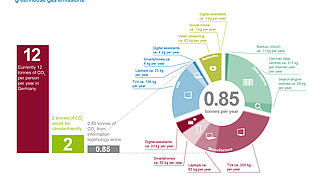The current production and consumption patterns in industrialised countries are not sustainable: our energy and resource consumption and greenhouse gas emissions are too high, we produce too much waste, and we are destroying the natural ecosystems on which our lives depend. However, there are many promising strategies that would enable us to switch to more sustainable consumption while avoiding overexploitation of resources and making use of renewable raw materials. Regulations that aim to increase energy efficiency, innovative and sustainably produced goods, labels that guide consumers towards sustainable consumption options, and modification of our consumption patterns all have a role to play here. In particular, a shift in mindset towards reduced but more conscious consumption would help us to respect the Earth’s ecological limits.
Efficiency, consistency and sufficiency – the Oeko-Institut’s researchers investigate all three strands of sustainable consumption. They devise methodologies for the assessment of eco-friendly products and services and support the development of sustainability criteria. They also produce strategies that policy-makers can use to initiate and promote sustainable behaviour, and they analyse potential policy instruments in terms of their effectiveness, efficiency, distribution effects and acceptance.
![[Translate to English:] © plainpicture / Maskot](/fileadmin/_processed_/1/0/csm_Nachhaltiges-Wirtschaften-Konsum-Suffizienz_plainpicture-Maskot_b49ee25539.jpg)








